

Research into the mental health of prisoners, digested. By Christian Jarrett Around the world, more people than ever are locked up in prisons – estimated to be in excess of 11 million people, up by almost 20 per cent since the turn of the millennium (pdf).

According to a recent House of Commons Briefing Paper the rate of increase is even higher than this in the UK where prison populations are at a record high. Many of these incarcerated individuals have intensifying mental health needs – for instance, the same briefing paper reports that UK rates of self-harm in prisoners were 25 per cent higher in 2015 than in 2014.
Ahead of this week’s meeting of the All Party Parliamentary Group for Psychology on the topic of Mental Health in the Criminal Justice System, here we provide a digest of research into the mental health of prisoners. Portraits of the mind. Antidepressants: Please, PLEASE, do not just abandon your meds! Please, do not just abandon your medication.
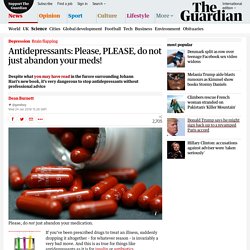
If you’ve been prescribed drugs to treat an illness, suddenly dropping it altogether – for whatever reason – is invariably a very bad move. And this is as true for things like antidepressants as it is for insulin or antibiotics. Antidepressant withdrawal syndrome is a real problem. Is everything you think you know about depression wrong? In the 1970s, a truth was accidentally discovered about depression – one that was quickly swept aside, because its implications were too inconvenient, and too explosive.
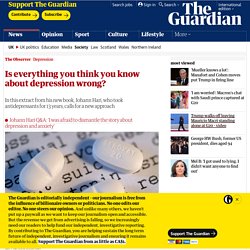
American psychiatrists had produced a book that would lay out, in detail, all the symptoms of different mental illnesses, so they could be identified and treated in the same way across the United States. It was called the Diagnostic and Statistical Manual. In the latest edition, they laid out nine symptoms that a patient has to show to be diagnosed with depression – like, for example, decreased interest in pleasure or persistent low mood.
These are the therapist behaviours that are helpful or harmful, according to clients. By Christian Jarrett Although psychotherapy is effective for many people, it doesn’t help everyone.
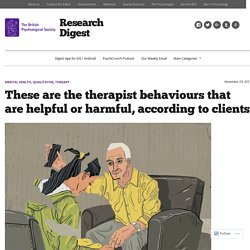
In fact, in some cases it can do more harm than good. And while clinical researchers publish many studies into the outcomes of different therapeutic approaches, such as CBT or psychoanalytic psychotherapy, we actually know relatively little about the specific therapist behaviours that clients find beneficial or unwelcome. A new study in the Journal of Clinical Psychology, although it involves only a small sample, has broken new ground by asking clients to provide detailed feedback on a second-by-second basis of their experience of a recent therapy session, and to explain their perspective on what took place.
Children with mental health problems 'guaranteed' treatment in four weeks. Children with anxiety and depression will be guaranteed treatment within four weeks in a new effort to improve mental health care, but lack of NHS staff and funding means the plan cannot be fully introduced until 2021.
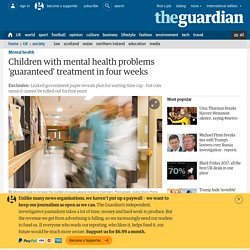
A leak from the forthcoming green paper on children’s mental health, due to be published in early December, reveals that for the first time, the government will introduce a maximum waiting time for youngsters needing such treatment. The four-week cap is intended to end what mental health charities say is the scandal of troubled children and young people in England having to endure long waits before they can see a psychiatrist, even if they have an eating disorder or have contemplated suicide. Some vulnerable under-18s are denied care for as long as 18 months, the Care Quality Commission warned in a recent report. The average wait to receive children’s care in England currently is 11 weeks.
Rates of self-harm, especially among teenage girls, have soared over the last decade. FDA approves 'trackable' pill. Image copyright Getty Images US regulators have approved the first pill that can be digitally tracked through the body.

The Abilify MyCite aripiprazole tablets - for treating schizophrenia and manic episodes - have an ingestible sensor embedded inside them that records that the medication has been taken. A patch worn by the patient transmits this information to their smartphone. The information can also be sent to the prescribing doctor, if the patient consents to this. Experts hope it could improve medication compliance, although the company that makes the tablets says this has not been proved for their product. Fall in young mental health patients on adult wards. Image copyright Getty Images The number of young people with a mental illness being treated in non-specialist wards has seen a "significant drop", a report has found.
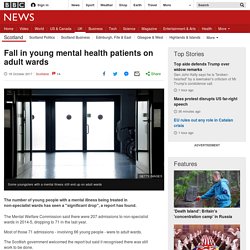
The Mental Welfare Commission said there were 207 admissions to non-specialist wards in 2014-5, dropping to 71 in the last year. Most of those 71 admissions - involving 66 young people - were to adult wards. The Scottish government welcomed the report but said it recognised there was still work to be done. Every health board in Scotland reported a fall in treatment on non-specialist wards, but the commission said there were "marked" reductions in Greater Glasgow and Clyde, Tayside, Ayrshire and Arran, and Grampian.
Cheating death and drawing identity: Twenty years of art at Bethlem Hospital. Chris Kirkland: ‘I didn’t want to wake up in the morning. It just starts again’ Chris Kirkland felt trapped, paralysed, desperate.

But the former England and Liverpool goalkeeper was terrified that he might have further to fall. “What happened to Gary Speed was the thing that really worried me,” Kirkland says, with reference to the Wales midfielder’s death in 2011. “I didn’t know how far away I was from that. Have you got the wrong impression about schizophrenia? Image copyright Getty Images Schizophrenia does not mean you have a split personality or automatically become violent, a mental health charity has warned.

Rethink Mental Illness said a survey of 1,500 people showed that the condition is widely misunderstood. Schizophrenia commonly causes hallucinations, such as hearing voices, or delusions and can make people lose interest in life. Transcript: Behind Bars with a Mental Illness - September 15 2017. This is a full transcript of 'Behind Bars with a Mental Illness' as presented by Damon Rose and Beth Rose and first broadcast on 15 September 2017 DAMON- This is Inside Ouch, I'm Damon Rose and with me is Beth Rose - not related.
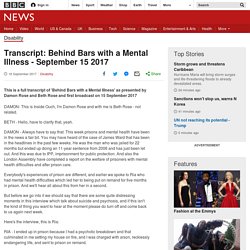
BETH - Hello, have to clarify that, yeah. DAMON - Always have to say that. This week prisons and mental health have been in the news a fair bit. You may have heard of the case of James Ward that has been in the headlines in the past few weeks. Maori words minted for autism and mental health issues. Image copyright Te Pou o te Whakaro Nui The Maori language of New Zealand has just expanded by 200 words and phrases, freshly minted to describe mental health, addiction and disability issues.
Keri Opai, the civil servant who helped devise the words, said they had been chosen not only to fill gaps in the Maori vocabulary, but also to ensure that the terms are non-judgemental. "In my experience, people with autism tend to have their own timing, spacing, pacing and life-rhythm, so I interpreted autism as 'takiwatanga', meaning 'his or her own time and space'," he told government-funded Maori Television.
Mr Opai consulted the Maori disabled community in order to develop variants that differ from what he called the "sometimes condescending English terms", and instead emphasise "gaining strength and ability. Mentally well voice-hearers have a heightened ability to detect real speech – Research Digest. By Emma Young Hallucinating voices isn’t always distressing. While the experience is commonly associated with schizophrenia, some people – an estimated 5 to 15 per cent of the general population – hear voices that aren’t real without finding it upsetting or debilitating (they may even welcome it) and in the absence of any of the other symptoms of psychosis, such as delusions or confusion.
Rep03 understanding psychosis. Prince wins praise for his candour over mental health. Prince Harry’s decision to open up about his mental health problems represents a “true turning point” in the fight to change attitudes, experts said. The prince said that losing his mother, Diana, Princess of Wales, when he was 12 had a profound effect on his adult life, which descended into “total chaos”. Using Architecture To Explain 16 Mental Illnesses And Disorders. If you had to imagine your mental illness or disorder as a house, what would it look like? Show Full Text. Diaries of a Broken Mind. Stephen Fry - The Secret Life Of The Manic Depressive Part 1. Britain's Mental Health Crisis. Bedlam - Anxiety Episode 1 of 4 Mental Health Inpatient UK Documentary 2013. Don't Call Me Crazy Episode 1 of 3 Mental Health Documentary 2013.
I'm Broken Inside - Sara's Story Mental Health Documentary 2016. BBC Mental A History of the Madhouse FULL DOCUMENTARY. Marks and Spencer offers cafe space for 'frazzled' people. Children face 12-month mental health wait. Image copyright Getty Images More than 100 children who began receiving specialist mental health care in the last three months of 2016 had waited more than a year to get help.
NHS Scotland figures showed that 4,222 patients started treatment from Child and Adolescent Mental Health Services (CAMHS) over the period. Of these, 101 had waited 53 weeks or more for their specialist help. Only 16 patients had to wait more than a year in the last quarter of 2015, the statistics showed. The NHS in Scotland provides specialist mental health care for children and young people suffering from conditions including attention deficit hyperactivity disorder (ADHD), anxiety, behaviour problems, depression and early onset psychosis. 'I was dragged to a psychiatrist - and it was the best thing I did'
'I don't recognise my father' in new film Mad To Be Normal. New film Mad To Be Normal, starring David Tennant, had its premiere as the closing gala of the Glasgow Film Festival on Sunday. It tells the story of famous Scottish psychiatrist RD Laing and his attempt to set up a "safe haven" at Kingsley Hall in London where people with schizophrenia and therapists lived together. Laing's son Adrian reacted to the film for BBC Scotland. Young people 'fear stigma' if they ask for mental-health help. Disability benefits should go to 'really disabled people' not 'anxiety sufferers', says Theresa May's adviser. 'Creativity improves wellbeing': art transforms mental health ward. Steep rise in A&E psychiatric patients.
Is this why the research on creativity and mental illness is so contradictory? From Van Gogh to Poe, history is littered with famous cases of creative geniuses plagued by inner turmoil. Pessimistic rats are extra sensitive to negative feedback. Depression is complex and influenced by many factors, but the way depressed people think is a likely contributor to the disorder. Depression is often associated with cognitive biases, including paying more attention to negative than positive events and recalling them more easily. People with depression also tend to ruminate over perceived failures and criticism, and they are extra sensitive to negative feedback. A lot of "voice hearing" isn't an auditory experience at all.
Bedlam’s Door.